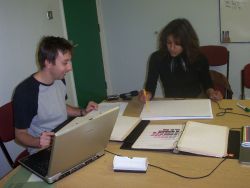Our research depends on a large pool of synaesthetes (and non-synaesthete controls) being available to participate in our experiments. Read on if you're interested in getting involved.
Who can take part?
We are interested in ALL types of synaesthesia, and not just the more common 'coloured letters' variety. If you are unsure whether your experiences are synaesthetic or not, then don't be afraid to get in touch. For some of our research we need to meet you in person and so it is important that you live in the UK or travel through the UK on a fairly regular basis. However, we also have questionnaires which can be done online (see below).
 An experiment in progress
An experiment in progress
What does taking part in the research involve?
First of all, you will be asked to fill in a general questionnaire and to describe any synaesthetic experiences that you have. This takes only 10 minutes and can be done here.
Following this, we may contact you again (normally via e-mail) to invite you to take part in further studies. These will involve basic tests of memory and perception. None of the tasks are harmful or stressful, and you may quit whenever you want. Synaesthetes typically enjoy taking part, and find it interesting to learn more about their own synaesthesia and gain insight into how it work
Can I “diagnose” my synaesthesia?
There is no formal medical diagnosis for synaesthesia. However, researchers have developed certain tools that are indicative of the presence of synaesthesia. You can test yourself online and share your results with us as part of our research programme.
Go to: https://synesthete.ircn.jp/home
Will my data and details be kept confidential?
Your personal details (name, address, etc.) will not be passed on to anybody else without first gaining your written consent. You will be referred to in our records and in any publications by your initials (or other code) in accordance with the 2018 Data Protection Act.
What are some of the topics that are currently being investigated?
We are interested in all aspects and types of synaesthesia but you can find out about some specific ongoing projects from this page:
